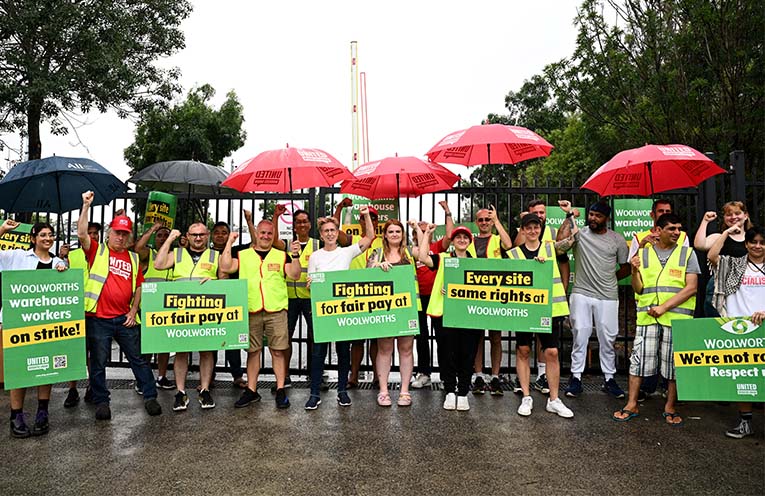
A UNION heavyweight has thrown her support behind striking Woolworths staff, arguing neither consumers nor workers had reaped the benefits of supermarkets’ cost-cutting drives.
ACTU boss Sally McManus on Friday joined a rally for warehouse workers from the grocery giant as they continue their week-long industrial action for better pay and working conditions.
 Advertise with News of The Area today.
Advertise with News of The Area today.It’s worth it for your business.
Message us.
Phone us – (02) 4981 8882.
Email us – media@newsofthearea.com.au
Woolworths denied shelves were beginning to run bare as a result of the strikes, despite 1500 workers across four NSW and Victorian distribution centres downing tools.
While the staff are asking for a pay increase, the United Workers Union also wants Woolworths to abolish a performance framework it says is pushing staff to sacrifice safety standards in pursuit of faster work.
At a rally outside a western Sydney distribution centre, workers held up placards with slogans like “we’re not robots”.
The message was a reference to a framework that allocates them a certain time for a task then ranks their performance out of 100, something they say puts undue pressure on them and has a negative impact on wellbeing.
Ms McManus said it was symptomatic of a supermarket industry that chased profit above all else, arguing Woolworths was gouging workers by not agreeing to the improved conditions.
“Everyone has experienced the fact supermarkets already brought in new technology, they have self-checkout machines, and what’s happened there?
“Have people seen a drop in the prices of the things they’re buying in the supermarket? Certainly not.
“All of these things are used, in the end, really just to increase their profits and their profits cannot be increased on the back of the safety of Australian workers.”
Woolworths and Coles, which together control about two thirds of the Australian grocery market, have been in the sights of politicians and the consumer watchdog over concerns they were profiteering during a cost-of-living crunch.
The Australian Competition and Consumer Commission recently finished a public inquiry into supermarkets’ pricing practices and relationships with suppliers, and is due to produce a final report in February.
Earlier, Woolworths insisted all stores were still receiving regular stock deliveries, but some were getting their goods less frequently than previously scheduled.
No product limits were in place apart from eggs, which had been rationed for some time following bird flu outbreaks in NSW and Victoria.
The union claimed the strike was already having a huge impact, with “gaping holes” on shelves normally containing household and frozen goods.
The grocer conceded some Victorian, NSW and ACT stores had “limited stock flow” but added extensive contingency plans were minimising the impact on customers.
A Woolworths spokeswoman said the company was working hard to sort out the pay dispute.
“We value our team and are deeply committed to reaching an agreement as quickly as possible so they can receive the benefit of their new pay rates before Christmas,” she said.
“We have already put forward several offers with competitive pay that is above industry standards, above local market rates, above inflation, and well above the award.”
But union president Jo Schofield warned the strike would persist until Woolworths showed more care for its staff.
“We’re going to be out for as long as it takes, it’s a fundamental principle for people to come to work, to do their job and work hard… and to go home safely,” she said.
“That’s why we’re out, and we’ll be out until Woolworths gets that message loud and clear.”
By Alex MITCHELL, AAP
